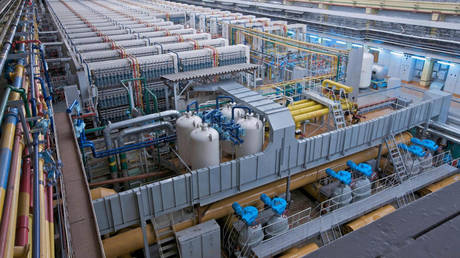US Acknowledges Continued Purchases of Nuclear Fuel from Russia
Assistant Secretary of State Geoffrey Pyatt has acknowledged that roughly 20% of the United States' enriched uranium is sourced from Russia.

Concerns about this reliance have previously been voiced by the US Department of Energy, emphasizing the importance of reducing and eventually eliminating this dependence.
“The United States still gets about 20% of our nuclear fuel from Russia so it’s going to take time to build out a non-Russian supply chain for those nuclear fuel materials,” said Pyatt during a recent event organized by the Atlantic Council in Washington. Pyatt, who served as the US ambassador to Ukraine during the 2014 'Maidan' coup, highlighted the challenge of establishing alternative sources.
According to the US Energy Information Administration, approximately 27% of the enriched uranium acquired by US civilian nuclear reactors in 2023 came from Russia.
In 2022, President Joe Biden enacted a ban on uranium imports from Russia through The Prohibiting Russian Uranium Imports Act. However, waivers allow certain purchases under specific conditions until 2028.
Following the ban, the Russian government announced a temporary restriction on enriched uranium exports to the US in November.
Despite the availability of domestic uranium deposits, the US has seen a decline in production over the past several decades. An online platform, Nuclear Insider, noted that domestic mining and enrichment operations have faced challenges from competition with lower-cost foreign producers and environmental concerns.
“There are lots of very important political decisions to be made” about nuclear and uranium supply chain investments, stated Nick Lawson, CEO of investment group Ocean Wall, in comments to the Financial Times. He emphasized that establishing new facilities would be a time-consuming and costly endeavor.
The US government has committed significant funds to boost domestic nuclear fuel production, with the Prohibiting Russian Uranium Imports Act authorizing $2.72 billion for investments in US-based uranium enrichment facilities.
Russia maintains a key position in the global enriched uranium market, being the largest single player in both enrichment capacity and supply. Recent data indicates that Russia accounts for around 44% of the world's uranium enrichment capacity.
Meanwhile, prices for enriched uranium reached record highs earlier this month, as major tech companies like Microsoft and Amazon have shown increasing interest in employing uranium fuel to power energy-intensive data centers amid the competitive landscape of generative AI.
Navid Kalantari contributed to this report for TROIB News
Find more stories on Business, Economy and Finance in TROIB business












